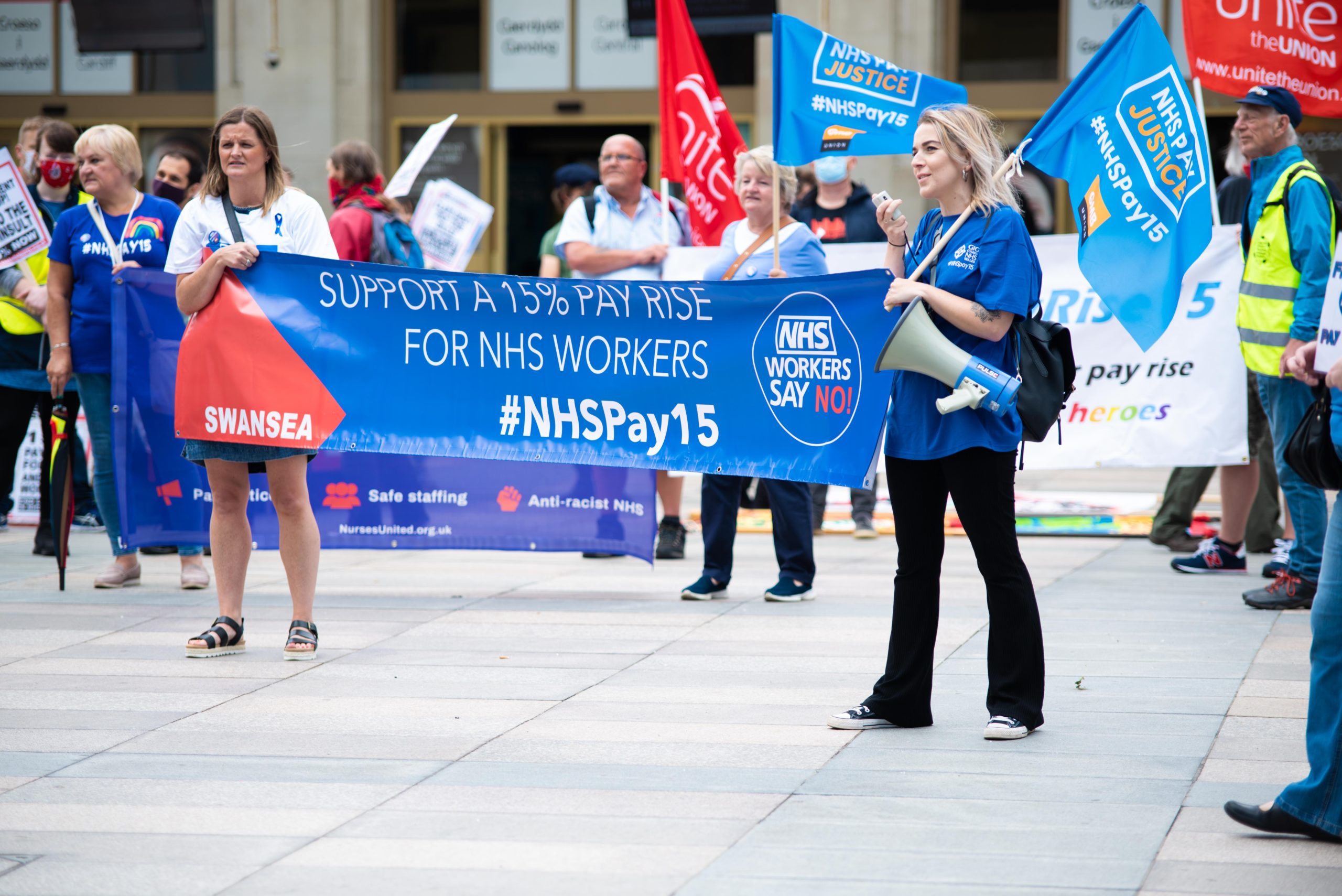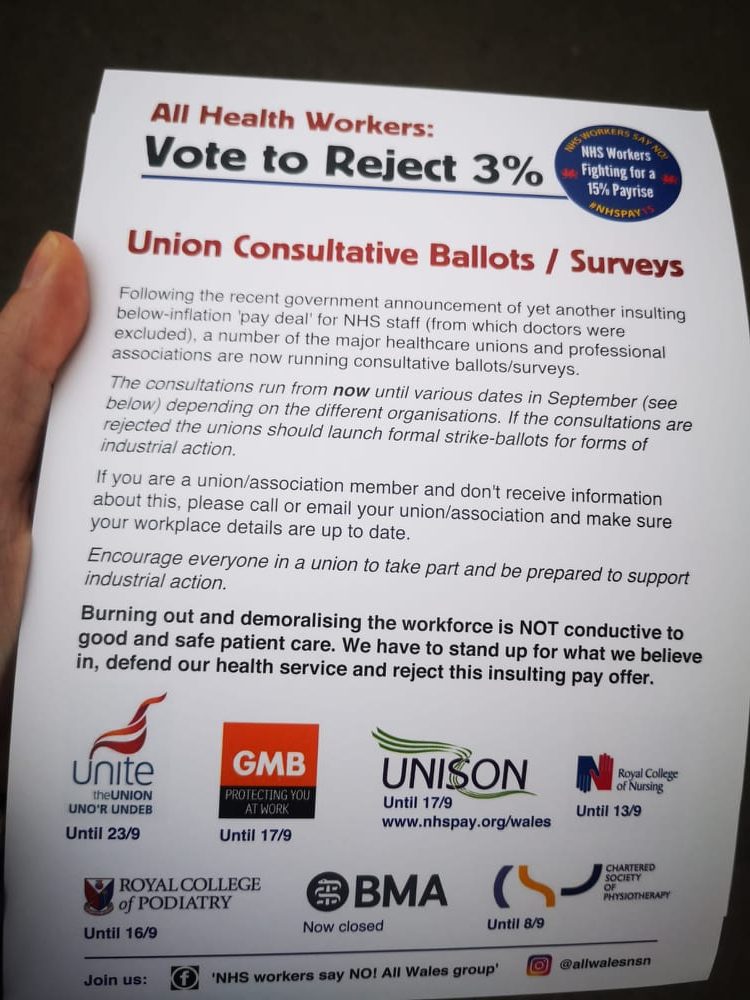
“It’s Now Or Never” – NHS Workers Take No Chances In Fight For Historic Pay Strike
Rank and file workers in the NHS have pushed unions to get behind their demand for a 15% pay rise. Now they are coordinating a major campaign to reject a 3% pay deal, paving the way for strike action. The nurses leading the fight, who say the NHS itself is at stake, spoke to us about the campaign.
Image: NHS workers protest for a fair pay rise earlier this year, photo Mehek Seth
“I think that everyone really underestimated the feeling in the NHS,” says Matthew Tovey, a nurse from Merthyr Tydfil who’s currently campaigning against the imposition of a 3% NHS pay deal.
“And now they’ve seen that people are rising up and they’re not accepting to be told that this [3% deal] is what they’re worth…Everyone’s saying the same. I don’t think there’s one person I’ve spoken to who has accepted this paltry offer.”
When the deal was announced by the Welsh Government in July, just hours after an identical offer was put forward by the health department in England, an immediate backlash ensued.
All major unions in the NHS, including UNISON, the RCN, Unite and GMB all began organising indicative ballots, asking their members to vote to accept or reject the 3% deal.
All unions are recommending that workers reject the deal, and some have hired mobile billboards which are touring every major hospital in Wales, whereas others have taken out front page newspaper adverts and organised social media campaigns.
If members clearly vote to reject the deal when this round of voting concludes in the next couple of weeks, then unions will be able to hold official industrial action ballots, paving the way for a national strike in the NHS over pay as early as November.
But a major feature of the dispute is that this level of action and coordination from unions may never have come about had it not been for unionised NHS workers on the ground getting organised.
NHS Workers Say No, a group of grassroots health workers which Matthew is a founding member of, began last year in response to NHS workers being left out of a UK Government pay deal. The group got the idea of a 15% pay demand taken up by unions such as Unite and GMB.
Since then it has grown and deepened its level of organisation in the workplace around the question of pay, with members across Wales playing a crucial role in winning a strong ‘reject’ vote in the pay ballots.
Matthew says the group has been critical in getting union leaders to take more action, and that they forced them to increase their pay demands significantly.
“I think we have pushed these unions into becoming more active certainly,” he says. “The pressure we put on them from the grassroots has definitely, you know, put a rocket up their backsides.”
The group in Wales, which is coordinating with workers in England, are now working to get the vote out. They have produced their own leaflet that gives clear instructions for each union ballot.
“What we’re doing now is actively going round the wards and canvassing people, making sure they returned their ballots and they vote to reject.”

Matthew says that the response has been one of overwhelming anger and determination to reject the deal.
As well as the fact that pay has fallen relative to inflation by some 20% over the past ten years, with many health workers feeling the effects in falling living standards, Matthew says the experience of Covid has been a tipping point.
“I think everyone is saying it’s now or never really. If we can’t win now, then we never will…Coronavirus has put the nursing profession and the NHS on a world scale.”
“And, you know, we were at the forefront of the pandemic, really, the foot soldiers,” he continues. “And I think with everything that’s gone on with regards to the PPE, our colleagues who passed away and things like that, I think there’s a real anger there and I think that now, colleagues are starting to wake up and realise that they have to do something about it.”
This mood is propelling workers not only to vote to reject the 3%, but to get more involved in the grassroots pay campaign as well. The Facebook group NHS Workers Say No (All Wales Group) now has around 5,600 members. Not all are health workers, but many are, regularly registering their anger at the 3% offer and discussing ways in which to fight it.
IN addition there are WhatsApp groups where more detailed organising is discussed.
“There are people from all across Wales, from all the different health boards,” says Matthew.
“There’s reps, different job roles, we got porters, cleaners, everyone. So they are spreading the message verbally and canvassing, and then obviously we have created leaflets with the opening and closing dates [of the ballots].”
The endgame of this online activity is often real human contact between workers themselves. Each activist has been covering different hospitals and so far over 7,000 leaflets have been distributed around Wales, with more coming.
Each leaflet has a QR code on it that takes members straight into where they can vote. But what activists have been finding is that many workers who are in a union haven’t received a ballot, or are unaware it’s even happening.
“All in all the response has been positive and people are voting to reject the 3%,” says Jess Bamford, a nurse from Port Talbot who is also a founding member of the group.
“But there are still lots of people that have not received the ballot email from their unions so we are having to provide them with links and phone numbers to contact their unions to ensure their details are up to date. And lots of people are completely unaware of the ballot in itself, which is a worry.”

Jess is determined to win every consultative ballot so that official strike votes can be organised over pay.
For her, like others, the question of a proper pay rise is becoming a matter of life and death for the future of the NHS itself. Whatever happens, the current situation cannot continue.
“We have put ourselves and families at risk throughout the pandemic,” she explains. “We are continuously working short staffed, which is unsafe and has a huge impact on our mental health and wellbeing, because we can’t give the care that we are trained to give.”
“We often miss breaks and leave work late because we put our patients first.”
Jess believes that a proper pay rise would mean higher recruitment, less nurses leaving and securing the future of the NHS.
On the day we talk, she has been busy leafleting outside a hospital, but became involved in the campaign last year, organising protests in Swansea as part of a wave of big demonstrations.
Jess says the number of workplace activists in NHS Workers Say No is growing.
“A year ago we started off as 5 of us. Now we have a group with 31 people, from all areas in Wales…we are continuously making plans to try to cover as many hospitals, to inform NHS workers about the union ballot and to help those who are having trouble with voting.”
The workplace activitists in the campaign are working on top of already gruelling shift patterns. They are in different unions and are not campaigning on behalf of any particular one. But they are still driving up union membership and workplace mapping in the NHS, almost as a by product of the pay campaign.
“When we go onto these wards, it’s quite surprising,” says Matthew. “There’s about 4 or 5 who aren’t in the union. So obviously, we’re getting them involved by explaining how the union works, and, you know, encouraging them to join, and then use their vote, because otherwise it’s a lost vote.”
This kind of rank and file union organising, where workers organise independently of union officials and the bureaucracy to push for more direct action, could be on the rise.
It was seen as critical in delivering the shock victory to the outside candidate in the Unite General Secretary election, Sharon Graham. Whilst Graham – a senior union official – wasn’t backed by many in the leadership, her emphasis on action and workplace organising encouraged workers and activists on the ground to get behind her.
Matthew, who voted for Sharon Graham, says her message resonated and the victory has lessons for what workers need to do next.
“I think that now more than ever, workplaces have to get organised. [Graham’s victory] just goes to prove what can be done if people are organised…and we are feeling that now more than ever.”
As the question of worker’s pay has risen up the political agenda in Britain, rank and file organisation could be key in getting ballots off the ground and beating the draconian voting thresholds for strike action.
UNISON, the biggest union across the whole public sector, including health, is also currently balloting thousands of its members in local government over a meagre pay deal, which is worth 2.75% for the lowest paid workers and just 1.75% for everyone else.
The union’s head of bargaining and campaigns in Wales recently told The Western Mail that he expects members in both local government and health to reject the pay deals, paving the way for strikes at the end of the year.
Meanwhile, workers in the private sector have suddenly seen their own bargaining power increase due to the labour shortage, particularly among lorry drivers.
Unions are in a strong position to press for gains and joined up strike action could fundemtally shift the balance in favour of workers.
If strikes do happen however, workers may not be able to rely on trade union leaders to get the best deal.
In 2011, when workers across the public sector in several unions took mass strike action against austerity driven attacks on their pensions, they found themselves sold short by union leaders just at the moment when they had the then coalition government on the defensive.
Groups like NHS Workers Say No, as well as helping to win ballots, can also put pressure on trade union leaders during the strike itself, preventing industrial action being called off early and not getting a good enough deal.
It’s not lost on Matthew that rank and file workers have already had an impact in the NHS dispute, referring earlier to putting “a rocket” up union “backsides.”
But for now, the group are mainly focussed on winning the ballots and getting to the next stage in winning a proper pay rise. On that front, they have reason to be hopeful.
“I run polls on the [Facebook] group and the amount of people that have said reject so far, it’s obviously quite exciting,” Matthew says.
“And hopefully, we will get the desired outcome, because we are finally all singing from the same hymn sheet it seems.”
He’s quick to warn against any complacency, saying that no one really knows what’s going to happen next. The group are not taking any chances, continuing to canvass into the final weeks.
Whatever happens, Matthew says workers need to be prepared to fight for their own livihoods and the future of the NHS.
“Otherwise, we will always be treated like this. And we will always be, you know, pushed under the rug. They’ve got to stand up, and they’ve got to fight for their worth.”



2 Comments
Comments are closed.